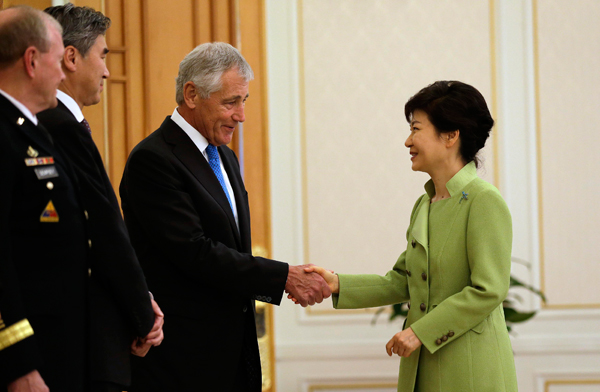The situation on the Korean Peninsula has been swinging back and forth since the Democratic People's Republic of Korea conducted its third nuclear test in February this year. The Kaesong industrial park, jointly run by the DPRK and the Republic of Korea, was reopened on Sept 16 sending signals that the tension on the Korean Peninsula had eased. But within a month, things were back to square one.

Park Geun-hye shakes hands with US Secretary of Defense Chuck Hagel before their meeting at the presidential Blue House in Seoul, Sept 30, 2013. [Photo/Agencies]
Over the weekend, the DPRK issued a fresh warning of launching an "all-out war" against the ROK and the United States because it saw the US-ROK-Japan maritime drills as a threat and also because the ROK media had "slandered the dignity of the supreme leadership of the DPRK". Besides, Pyongyang restarted its Yongbyon nuclear reactor last week, two months after it tested a long-range rocket engine.
The rising tension on the Peninsula is the result of the DPRK's new two-line strategy of economic reconstruction and nuclear development. But the equal emphasis Pyongyang lays on economic reconstruction and nuclear development, known as the "Byungjin Line", is paradoxical. The DPRK cannot sustain its economic development without the help of the international community, but by developing nuclear weapons, it will only invite further sanctions from the international community. In other words, nuclear buildup and economic reconstruction cannot go hand-in-hand for the DPRK.
The DPRK's "Byungjin Line" has created a tricky situation on the Korean Peninsula. Pyonyang, according to its strategic policy, needs to conduct nuclear and missile tests to develop nuclear weapons. But the tense international environment it has created will only harm its already weak economy. Consequently, the DPRK will be forced to ease the tension because of its rising economic needs.
The volatile situation on the Peninsula is a severe challenge for China and the international community. On the DPRK nuclear issue, China has to cooperate with the US and Japan, but it cannot possibly accede to the strategic demands of Washington and Tokyo.